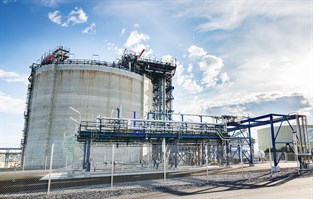Germany's LNG import project plans
(Reuters) - German plans for LNG terminals are picking up speed since Berlin declared them vital to its efforts to diversify away from Russian energy.
The projects had long languished as piped supply was less expensive than LNG.
Germany has now leased four floating storage and regasification units (FSRUs) and chosen Wilhelmshaven as its first LNG handling hub, ahead of additional sites that will also be able to handle deliveries of low-carbon gases and clean hydrogen.

WILHELMSHAVEN
A first FSRU is expected to become ready late this year or early next year, followed shortly afterwards by a second at Brunsbuettel.
The government has earmarked 2.94 B euros ($3.07 B) for the projects, due to be developed by utilities RWE and Uniper, respectively.
Uniper's plans for Wilhelmshaven also entail an import terminal for ammonia, an electrolysis plant to turn that into clean hydrogen, and a clean hydrogen storage unit at Krummhoern.
As for a separate project, Tree Energy Solutions is talking to over 25 interested parties about its plans for an LNG terminal to be called AvantHy at Wilhelmshaven in partnership with E.ON. It expects to complete the discussions in July.
It recently brought these plans forward to 2025, also with a view to handle zero-carbon gases - such as methane - from 2027.
BRUNSBUETTEL
Schleswig-Holstein's state government wants an FSRU quickly, as a forerunner of a fixed LNG facility with capacity of 8 Bcm - expandable to 10 Bcm.
This project could start in 2026 or earlier and would be developed by state bank KfW with a 50% stake, RWE with 10%, and Dutch operator Gasunie with 40%.
Shell would book a large part of the LNG.
STADE
Project company Hanseatic Energy Hub, backed by Belgian gas transport networks group Fluxys, Swiss investment company Partners Group and German logistics group Buss, aims to develop a 12 Bcm terminal at the river port by 2026.
A final investment decision is expected next year.
Chemicals company Dow would take a minority stake and utility EnBW intends to buy 3 bcm a year.
HAMBURG, ROSTOCK
Port city Hamburg, as well as Rostock on the Baltic Sea have also been touted as possible locations for an FSRU.
($1 = 0.9591 euros)
(Reporting by Vera Eckert; Editing by Marguerita Choy)

- RWE strengthens partnerships with ADNOC and Masdar to enhance energy security in Germany and Europe
- TotalEnergies and Mozambique announce the full restart of the $20-B Mozambique LNG project
- Venture Global wins LNG arbitration case brought by Spain's Repsol
- KBR awarded FEED for Coastal Bend LNG project
- Norway pipeline gas export down 2.3% in 2025, seen steady this year



Comments